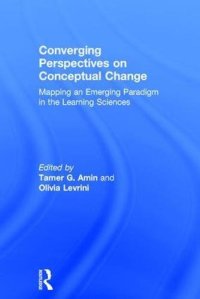
Ebook: Converging Perspectives on Conceptual Change: Mapping an Emerging Paradigm in the Learning Sciences
Author: Tamer G. Amin Olivia Levrini
- Tags: Schools & Teaching, Certification & Development, Common Core, Computers & Technology, Counseling, Curriculum & Lesson Plans, Distance & Online Learning, Early Childhood Education, Education Theory, Funding, Homeschooling, Instruction Methods, Parent Participation, Special Education, Student Life, Teacher & Student Mentoring, Education & Teaching, Education, Administration, Counseling, Curriculum & Instruction, Educational Philosophy, Elementary Education, History & Theory, Secondary Education, Special Education, New Use
- Year: 2017
- Publisher: Routledge
- Edition: 1
- Language: English
- pdf
Conceptual change, how conceptual understanding is transformed, has been investigated extensively since the 1970s. The field has now grown into a multifaceted, interdisciplinary effort with strands of research in cognitive and developmental psychology, education, educational psychology, and the learning sciences. Converging Perspectives on Conceptual Change brings together an extensive team of expert contributors from around the world, and offers a unique examination of how distinct lines of inquiry can complement each other and have converged over time.
Amin and Levrini adopt a new approach to assembling the diverse research on conceptual change: the combination of short position pieces with extended synthesis chapters within each section, as well as an overall synthesis chapter at the end of the volume, provide a coherent and comprehensive perspective on conceptual change research.
Arranged over five parts, the book covers a number of topics including:
- the nature of concepts and conceptual change
- representation, language, and discourse in conceptual change
- modeling, explanation, and argumentation in conceptual change
- metacognition and epistemology in conceptual change
- identity and conceptual change.
Throughout this wide-ranging volume, the editors present researchers and practitioners with a more internally consistent picture of conceptual change by exploring convergence and complementarity across perspectives. By mapping features of an emerging paradigm, they challenge newcomers and established scholars alike to embrace a more programmatic orientation towards conceptual change.